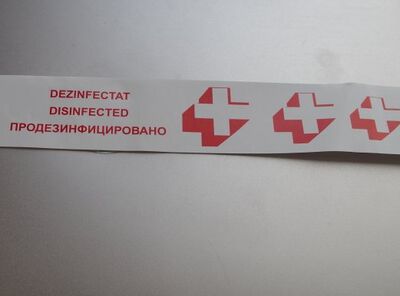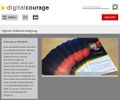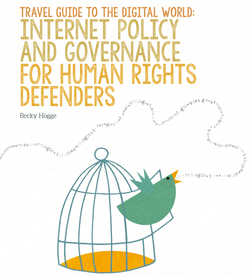Privacy Protection
In times, where a lot of communication takes places electronically, we have to rethink our care for privacy. Currently most communication data might be stored and analized through those who are not the addressee. For maintaining privacy we need to use specific tools that make surveillance less possible or even impossible.
Beyond this defensive motivation there could be another reason for showing interest for technical tools for protection. Privacy means not only to defend ourselves against nosey pencil pushers. Through a privacy-aware attitude civil actors contributes to more quality of communication and shape spaces of confidentiality.
Contents
Introductions Into Privacy and Tracking
Security in a Box
Tactical Tech Collective gives an up-to-date overview over general aspects and tools for privacy protection.
OnlineMotherboard Guide to Not Getting Hacked
A comprehensive guide to digital security
DownloadMy shadow
Tactical Tech Collective's introduction into tracking technologies
OnlineBig Brother Awards
These negative awards give you an insight in the state of art of big data and surveillance.
OnlineDigitale Selbstverteidigung
Digital courage's German languaged privacy page
Online
Videos
- Do Not Track: ARTE's videos introduce into the world of Big Data in German, English, French
Passwords
Principles & Criteria |
|
Password Manager |
The best electronic tool does not help, when your password is written in an email that is saved in an online email account. Here it can easily be read out. Therefore passwords should better be stored in a more safe place in digital wallets. If you use them, you need only to know one password for accessing the database of such a software. And you might copy and paste them into a form without anibody seeing the password when looking over your shoulder.
|
Virtual Keyboards
...do you know from mobile devices as screen keyboards. These may help when you want to hide your keystrokes from programs logging secretely, which keys you press.
- Virtual Keyboards are on board in Linux, Win, MacOS
Encryption
Disk Encryption |
...makes it complicated or impossible to read hard disks without authorization.
|
File Encryption |
|
Lock & Screensaver
When you use your computer in cafés and you are on the toilet, make sure that your device is saved from nosey neighbors. A screen saver password locks your computer when the screen saver is on. Or,
- when going to the toilet, use the lock command.
Surveillance Free Connections to the Internet
Between your computer and the internet will be established a connection. In cafés, Hotels, or in some public spaces you get it for free through Ethernet (internet cable) or WiFi. Please consider, that this is not confidential. The guy on the reception may even track your browser history if he uses the right programs. And if you do not visit a SSL secured website (starts with https://), as well the content of visited websites.
VPN is a tool that helps you to surf and email save in critical environments and countries with a strong surveillance policy. This technology builds an encrypted connection to a server in a trustful environment. Therefore you access the internet through this trustful server, not directly through your hotel WiFi.
- VPN clients are included in Linux and MacOS
- VPN server need to be set up, often you need to buy a license from one provider.
Browsing
SSL |
SSL holds back those who would like to read the content of the websites you visited. In example, when you fill out an online form. Or for dinding out, which news you received in your Inbox.
|
|
TOR |
TOR-Project provides browsers that hide your access data. For the servers, that you are addressing and the men in the middle between you and the website you are seen as someone else with a different IP address than your existing address. This technology works as well, when you have no VPN-connection but need to surf confidential.
|
|
Typing Confidential Personal Information |
|
|
Clear Surf History and Cookies |
Cookies are files left on your computer that track you. Unfortunately we need these for some things like webmailers or access to other webpages with a log in. But you might influence which kind of cookies might be accepted and when it will be deleted.
|
|
Block Tracking |
|
|
Saving Passwords in Browsers (not) |
|
Mobile Communication
Current state-of-the-art |
|
Trustworthy apps on your mobile device |
Your mobile phone provider and network providers track you through account data, bill data, your personal SIM-number (IMSI), the number of your device (IMEI) and, if governments come into the game, as well more things (i.e. they block the access to your number during demonstrations). Additionally app programmers try to offer you apps for free, that have the only one reason - to spy. Or why does your pocket lamp app require access to your contacts? Depending from your surrounding and activity, you should take these technical feasabilities into account.
|
Messengers | |
Text Collaboration |
|
Providers & Webmailers |
|
PGP Encryption |
|
Books & Online Sources
Related:
B. Hocks
Travel Guide to the Digital World
Internet Policy and Governance for Human Rights Defenders










